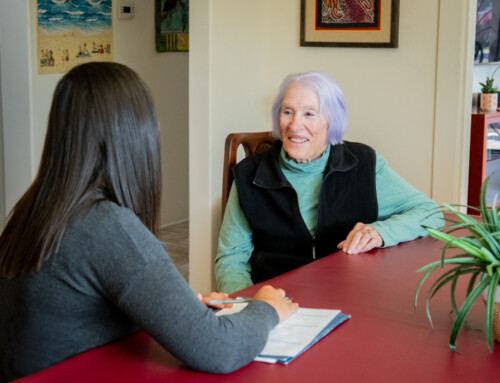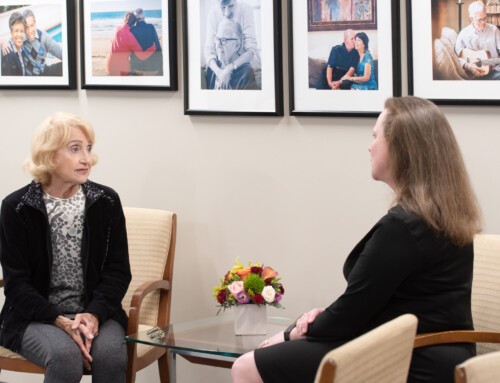
Receiving a diagnosis of Alzheimer’s disease can be an overwhelming and scary experience. You may discover shortly after the diagnostic process that there are very few treatment options and no known cure for this disease. It is not uncommon for those living with Alzheimer’s disease and their families to express feelings of fear, grief, or even hopelessness after receiving this diagnosis. There are many resources, such as our organization and others, to help families process these emotions and plan for the future. However, it is important to be aware that there are also for-profit healthcare organizations that capitalize on these feelings and lack of viable Alzheimer’s disease treatment options. It is incredibly important to be aware of what medical and holistic interventions are available in the community, and understand the risks and benefits associated with each option. Alzheimer’s San Diego doesn’t provide medical advice or treatment plans, so we strongly encourage families to discuss all of these options with their neurologist, geriatrician, and/or general practitioner.
Asking the Right Questions
Reviewing and researching the many medical and holistic treatment options that are marketed to consumers for the treatment of dementia can be confusing and frustrating. You may encounter pharmaceutical advertisements, commercials, books, and online resources that offer conflicting advice and information. You may even hear about treatment options from a trusted friend or family member. Whenever you are considering any treatment option, keep the following in mind:
- Is the source of the information reputable and reliable? Always be wary of sources that are funded by organizations or individuals who have a financial stake in promoting a particular treatment. For example, some clinics recommend supplements that can only be purchased, often at a high premium, from that particular clinic. It is good practice to seek information from peer-reviewed journals, scientific publications, or trusted healthcare resources. If you have questions about anything that is medical in nature, speaking with your doctor to clarify the information is always a good idea.
- Is the information being presented in an unbiased manner? Any organization or professional who is presenting information on a medical treatment should be prepared to discuss the risks as well as the benefits of the treatment. Risks might include possible side effects, drug interactions, or financial cost.
- Be wary of grandiose claims or promises. Consumers should pay special attention to the language that is used to promote a product or treatment.There is no known cure for Alzheimer’s disease or many other forms of dementia. Any organization, clinic, or healthcare entity that claims they are able to “reverse” the course of the disease or “cure” the disease should be viewed with skepticism and caution.
FDA-Approved Alzheimer’s Disease Treatment Options
There are a number of medications that have been on the market for many years and may be recommended to you by your physician. The most well-known medications are Namenda (Memantine) and Aricept (Donepezil). These medications have been heavily researched and approved by the FDA. Studies have shown that these medications can have a modest impact on symptoms related to Alzheimer’s disease when individuals begin taking them while in the early stages of the disease. As is the case with all medications, there can be side effects so it is important to discuss these risks with a healthcare provider and report any new symptoms or changes that occur after starting these medications.
In recent years, a new type of treatment was developed and approved by the FDA for treatment of Alzheimer’s disease: Monoclonal Antibodies. There are currently two monoclonal antibody treatments on the market: Aduhelm (Aducanumab) and Leqembi (Lecanemab). These drugs are the first to target and remove beta-amyloid from the brain. However, since these drugs are very new they are not as easily accessible. These treatments are administered intravenously and require ongoing monitoring and testing by healthcare providers to ensure they are working and not causing serious side effects. Due to the serious nature of the side effects that were observed in some clinical trial participants, it is very important to weigh the potential risks and benefits of this treatment option with a neurologist before consenting to treatment. Many healthcare providers in San Diego are also still working on developing processes and obtaining the space and equipment needed to offer these treatment options. It should also be noted that there is also a significant cost associated with these treatments despite Medicare’s coverage policy which covers 80% of the cost. All of these factors make this treatment difficult to access and it is often not a viable option for many of the families we work with.
Alternative Treatment Options
Many families who are facing a diagnosis of Alzheimer’s disease understandably feel disheartened by their lack of treatment options and seek alternative solutions. Alzheimer’s San Diego promotes healthy lifestyle choices that maintain brain health, such as a heart-healthy diet, regular exercise, and social interaction. There is compelling evidence to suggest that diet and lifestyle choices play a significant role in our cognitive health, whether we are living with dementia or not. However, there is no known diet, supplement, or exercise regimen that is shown to cure or reverse the course of Alzheimer’s disease. Despite this, there are many “health and wellness” companies in our community that market their products or treatments as a cure or solution to an Alzheimer’s disease diagnosis.
The most well-known of these alternative treatment options is the ReCODE protocol, which was developed and is often promoted by Dale Bredesen, who was once a practicing physician in California. A number of clinics have begun to offer this protocol at a premium price in San Diego County. It is important to note that this treatment is not approved by the FDA or covered by traditional medical insurance, so the full burden of cost falls on the consumer. This protocol is individualized for each person but often entails a substantial amount of supplements, a strict diet and lifestyle regime, and a number of tests that are not traditionally offered in mainstream medical settings. As mentioned before, positive changes to diet and lifestyle can have a positive impact on cognition for any person, but they are not shown to cure or reverse the course of Alzheimer’s disease. Despite this, these treatments are often presented as a curative solution to families who are eager to hear that they can reverse their loved one’s cognitive decline. Currently, the research behind this protocol is extremely limited and there is no compelling evidence to suggest that it has the ability to reverse the course of Alzheimer’s disease.
Learn about the latest dementia research in San Diego by viewing our 2023 Date with a Cure research forum, where experts discuss advancements like the aforementioned FDA-approved drug Leqembi (Lecanemab) and more. You can also view our free services or call us at 858.492.4400 to talk with a dementia expert.
Clinical Care Coach Corner: Written by Kristen Romea, LCSW
RECOMMENDED: Tech Scams in San Diego to Look Out For
Our “Clinical Care Coach Corner” series is where our team of dementia experts weigh in on unique topics and provide insight that can help people impacted by dementia.
Posted on February 5th, 2024
Resources – This article was developed in collaboration with Dr. Ian Neel, M.D., Medical Director of Geriatric Medical Consult Service at Senior Behavioral Health, UCSD. Other resources that were used include:
There are an abundance of local resources that are available to help those in San Diego county make informed decisions about their medical treatment options as well. These include:




